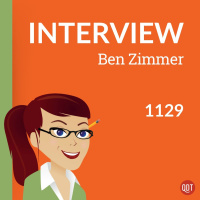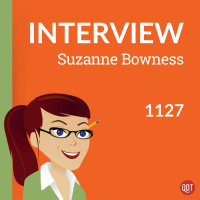Sinopsis
You'll get fun and friendly doses of writing advice in three short chunks: a Quick and Dirty Tip, a meaty middle, and a final tidbit. Grammar Girl covers everything from punctuation and grammar to style and voice. QuickandDirtyTips.com
Episodios
-
War of the dots. Why we say 'pitch black.' Pitch hot.
30/12/2025 Duración: 15min1146. This week, we look at the history of Braille, from the tragic accident that inspired Louis Braille's six-dot system to the "War of the Dots"—a decades-long conflict over competing reading standards in the U.S. Then, we look at the origin of the phrase "pitch black," revealing how the intensifier "pitch" refers to an ancient, dark wood tar and how the word traces its roots back to Old English.The braille segment was written by Karen Lunde, a longtime writer and editor turned web designer and marketing mentor. Solo service business owners come to her for websites where beautiful design meets authentic words that actually build connections. Find her at chanterellemarketingstudio.com.The pitch black segment was run by Samantha Enslen who runs Dragonfly Editorial. You can find her online at dragonflyeditorial.com.Links to Get One Month Free of the Grammar Girl Patreon (different links for different levels)Order of the Snail ($1/month level): https://www.patreon.com/grammargirl/redeem/687E4Order of the Aardva
-
How a long-lost yearbook revealed the origin of 'hella,' with Ben Zimmer
25/12/2025 Duración: 30min1145. In this bonus segment from October, I talk with Ben Zimmer about "hella" and how even yearbook messages can be digitized to help preserve the language record. Ben shares the full story of this slang term, and we also talk about the detective work that led to the OED using Run DMC's use of "drop" in “Spin Magazine” as a citation.Ben Zimmer's website: Benzimmer.comBen Zimmer's social media: Bluesky. Facebook. Links to Get One Month Free of the Grammar Girl Patreon (different links for different levels)Order of the Snail ($1/month level): https://www.patreon.com/grammargirl/redeem/687E4Order of the Aardvark ($5/month level): https://www.patreon.com/grammargirl/redeem/07205Keeper of the Commas ($10/month level): https://www.patreon.com/grammargirl/redeem/50A0BGuardian of the Grammary ($25/month level): https://www.patreon.com/grammargirl/redeem/949F7
-
The origin of X in algebra. Why we say ‘how come’ for ‘why.’ Water handles.
23/12/2025 Duración: 17min1144. This week, we look at the origin of the letter X as the variable for the unknown in algebra. Then, we look at the phrase "how come," explaining why it's more informal than "why" and how its grammar subtly differs from other question words.That X segment was written by Peter Schumer, Professor of Mathematics and Natural Philosophy at Middlebury College, and it originally appeared on The Conversation and appears here through a Creative Commons license.Links to Get One Month Free of the Grammar Girl Patreon (different links for different levels)Order of the Snail ($1/month level): https://www.patreon.com/grammargirl/redeem/687E4Order of the Aardvark ($5/month level): https://www.patreon.com/grammargirl/redeem/07205Keeper of the Commas ($10/month level): https://www.patreon.com/grammargirl/redeem/50A0BGuardian of the Grammary ($25/month level): https://www.patreon.com/grammargirl/redeem/949F7
-
2025 Words of the Year, with Jess Zafarris and Danny Hieber
18/12/2025 Duración: 24min1143. This week, we look at the 2025 words of the year with Jess Zafarris and Danny Hieber. We look at viral slang like "six seven" and cultural terms like "rage bait" and "fatigued." We also look at the dramatic rise of "slop" to describe low-quality AI content and how words like "parasocial" are changing function.Find Jess Zafarris at UselessEtymology.com, or find her podcast Words Unravelled on YouTube.Find Danny Hieber at LingusiticDiscovery.com or on his Substack.Links to Get One Month Free of the Grammar Girl Patreon (different links for different levels):Order of the Snail ($1/month level): https://www.patreon.com/grammargirl/redeem/687E4Order of the Aardvark ($5/month level): https://www.patreon.com/grammargirl/redeem/07205Keeper of the Commas ($10/month level): https://www.patreon.com/grammargirl/redeem/50A0BGuardian of the Grammary ($25/month level): https://www.patreon.com/grammargirl/redeem/949F7
-
'Pride and prejudice' before Jane Austen. Was Parson Brown a real person? Happy Panda.
16/12/2025 Duración: 15min1142. This week, we look at the history of the phrase "pride and prejudice," which was used frequently before Jane Austen’s 1813 novel. Then, we look at whether Parson Brown from “Winter Wonderland” was a real person, and why his name is sometimes replaced with a “circus clown.” Links to Get One Month Free of the Grammar Girl Patreon (different links for different levels)Order of the Snail ($1/month level): https://www.patreon.com/grammargirl/redeem/687E4Order of the Aardvark ($5/month level): https://www.patreon.com/grammargirl/redeem/07205Keeper of the Commas ($10/month level): https://www.patreon.com/grammargirl/redeem/50A0BGuardian of the Grammary ($25/month level): https://www.patreon.com/grammargirl/redeem/949F7
-
The 'sheeple' incident, with Stefan Fatsis
11/12/2025 Duración: 25min1141. We look at the controversy that caught Stefan Fatsis by surprise when he defined the word "sheeple" for Merriam-Webster, leading to public complaints. We also look at the origin and purpose of the obscure "Backward Index" invented by Webster's Third editor Philip Gove and how quickly Merriam added COVID-related words to the dictionary.Find Stefan Fatsis on his website, Bluesky or Facebook. Get the book, Unabridged.
-
The rise of the 'hamster wheel.' The many names of Santa Claus. Unattractive turtles.
09/12/2025 Duración: 14min1140. This week, we look at the difference between the modern phrase "hamster wheel" and the older "rat race," and why the former gained popularity. We also look at the similar concept of the hedonic treadmill. Then, we look at the many names for Santa Claus, including the Dutch "Sinter Klaas" and the German "Christkindlein."The Santa Claus segment originally appeared on The Conversation and was written by Valerie Fridland, a professor of linguistics at the University of Nevada in Reno and the author of "Like Literally, Dude: Arguing for the Good in Bad English." You can find her at valeriefridland.com.
-
An inspiring tutor, 'New York System' hot dogs, and 'queen spotting.'
04/12/2025 Duración: 25min1139. In this bonus discussion with Martha Barnette back in March, we look at Martha's pivotal twelve-year journey with a polyglot tutor who transformed her understanding of ancient Greek, starting with the etymology of "Oedipus." We also look at her beekeeping adventures, including the unknown-to-me history of the term 'queen bee' and a unique book on spotting them.Martha Barnette's websiteMartha's book, “Friends with Words: Adventures in Languageland”Martha's podcast, "A Way with Words"
-
Why Brits eat biscuits and Americans eat cookies. Why brands keep nouning everything. Hamster alert.
02/12/2025 Duración: 17minThis week, in honor of National Cookie Day, we look at the vocabulary split between British and American English, including the differences between a cookie and a biscuit, and the two meanings of "pudding." Then, we look at anthimeria, the advertising trend of turning one part of speech into another, as in the slogan "Together makes progress."The anthimeria segment was by Ben Yagoda,whose books include "Gobsmacked! The British Invasion of American English" and the novel "Alias O. Henry." His podcast is "The Lives They’re Living."
-
Rob Drummond on languaging and our fluid speaking identities
27/11/2025 Duración: 18minIn this bonus conversation with Rob Drummond from back in June, he and I get into the fascinating concept of "languaging" — the idea that speaking is an active process we use to constantly shape and project our identities. Rob explains how our "speaking identities" are incredibly fluid, changing based on context, audience, and even the language we're using. Rob Drummond - https://bsky.app/profile/robdrummond.bsky.socialRob's book, "You're All Talk"
-
The sinful fork (and other dinner-table surprises)
25/11/2025 Duración: 14min1136. This week, we go full Thanksgiving, talking about the origin of butter knives, forks, and more. You'll love all the tidbits you can share with your family or friends during dinner.
-
Why print dictionaries still matter, with Peter Sokolowski
20/11/2025 Duración: 35min1135. This week, we talk with Peter Sokolowski, editor at large at Merriam-Webster, about the new print 12th Collegiate Dictionary. We look at why print still matters, how the dictionary used lookup data to decide which words to drop (least looked-up compounds), and the importance of serendipity when researching words in a physical book.Find Peter on BlueSky.
-
Personification in language and AI. Dictums, maxims, and proverbs. Expensitive.
18/11/2025 Duración: 17min1134. This week, we look at the poetic power of personification (the language quirk that gives human traits to nonhuman things) and why style guides advise against using it for AI. Then, we look at the different names for common sayings, defining a proverb and breaking down the four main types: maxim, adage, dictum, and truism.The personification segment was written by Karen Lunde, a longtime writer and editor turned web designer and marketing mentor. Solo service business owners come to her for websites where beautiful design meets authentic words that actually build connections. Find her at chanterellemarketingstudio.com.The proverbs segment was written by Jim Norrena, MFA, who has been writing, editing, and leading grammar and proofreading workshops for more than thirty-five years. He founded TypoSuction.com, an independent editorial service, and is a member of Bay Area Editors’ Forum. He also serves on the board of Professional Publishers Network. You can find him at LinkedIn.
-
The secret rules of crossword puzzles, with Natan Last
13/11/2025 Duración: 29min1133. This week, crossword pro Natan Last talks about his book "Across the Universe." We look at the technical and cultural differences between American and British puzzle styles and the secrets that will surprise you about how clues are written and edited. We also look at "crosswordese," the long submission process for the “New York Times,” and the AI that won a human crossword tournament.Find Natan Last at Natanlast.com.Get the book, "Across the Universe."
-
How '23 skidoo' & 'at sixes and sevens' are related to '6-7.'
11/11/2025 Duración: 18min1132. This week, in honor of Dictionary.com choosing "6-7" as its Word of the Year, we look at the origin of other number phrases: "23 skidoo" and "at sixes and sevens."
-
What a ‘Science' magazine experiment says about the future of AI in journalism, with Abigail Eisenstadt.
06/11/2025 Duración: 23min1131. This week, we talk with ‘Science' magazine senior writer Abigail Eisenstadt about her team's year-long experiment testing ChatGPT's ability to summarize research papers. We look at their methodology, the limitations they realized, and their main finding: that AI could “transcribe” scientific studies but failed to “translate” them with context. Read the report: https://www.science.org/do/10.5555/page.2385668/full/chatgpt_project_report_final.pdf
-
What Roman togas have to do with today's elections. 'Home in' versus 'hone in.'
04/11/2025 Duración: 16min1130. This week, we look at words related to elections, and then I help you remember the difference between "home in" and "hone in" with a tip that includes a shocking historical tidbit about spiders.
-
Finding the true history of words, with Ben Zimmer
30/10/2025 Duración: 26min1129. This week, we talk with Ben Zimmer about the linguistic detective work of antedating words — finding earlier usages than those published in dictionaries. We look at the surprising origins of "Ms.," "scallywag," and the baseball history of "jazz."Find Ben on his website: Benzimmer.comVietnam Graffiti Project at Texas Tech's Vietnam Center: https://www.vietnam.ttu.edu/graffiti/The interface for searching the text on the canvas bunk bottoms: https://vva.vietnam.ttu.edu/#graffitiSearchBen's post that includes the Daily Orange article where Helen Herman’s claims she coined "supercalifragilisticexpialidocious." March 10, 1931: https://www.visualthesaurus.com/cm/wordroutes/tracking-down-the-roots-of-a-super-word/
-
‘Ghost words’ and their history. Rules for ‘between’ and ‘among.’ Wilsoning.
28/10/2025 Duración: 14min1128. This week, in honor of Halloween, we look at “ghost words” and phrases, from “ghost runners” in baseball to “ghost forests” made by earthquakes. We also look at the difference between “between” and “among” for collective groups.Episodes mentioned in this episode: 734 - Ghost Words1056 - How to be a ghostwriter, with Dan Gerstein
-
How to be a ‘feisty freelancer,’ with Suzanne Bowness
23/10/2025 Duración: 28min1127. This week, we talk with Suzanne Bowness about creating a successful life as a writer. We look at high-value industries that are good targets for freelance work and the best job titles to pitch. Suzanne provides practical advice on tracking projects and follow-ups and explains why established freelancers should use their downtime to experiment and learn new tools.Find Suzanne on her website, Codeword Communications.Get the book, "Feisty Freelancer."




























